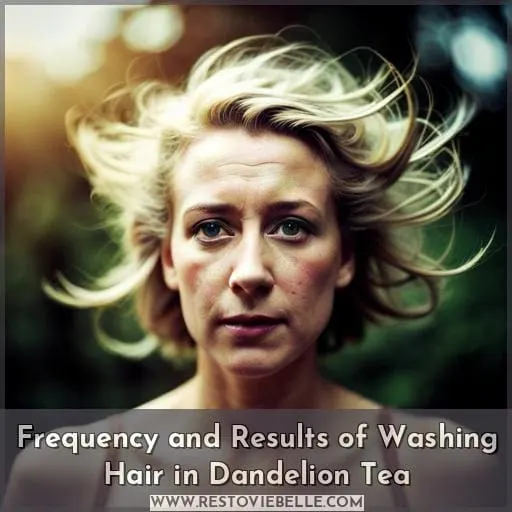This site is supported by our readers. We may earn a commission, at no cost to you, if you purchase through links.

Did you know that washing your hair in dandelion tea can boost growth and promote scalp health? With its rich nutrients and soothing properties, dandelion tea has been used for centuries as a natural remedy.
Discover how this simple yet effective method can transform your hair care routine. Say goodbye to dull locks and hello to vibrant, flourishing tresses with the power of dandelion tea.
Table Of Contents
- Key Takeaways
- Benefits of Washing Hair in Dandelion Tea
- How to Prepare Dandelion Tea for Hair Washing
- Steps to Wash Hair With Dandelion Tea
- Precautions and Side Effects of Washing Hair in Dandelion Tea
- Frequency and Results of Washing Hair in Dandelion Tea
- Frequently Asked Questions (FAQs)
- Can washing hair with dandelion tea change the color of my hair?
- Is it necessary to use dandelion tea as a rinse after shampooing?
- Can washing hair with dandelion tea help with scalp conditions like dandruff or dryness?
- Is it safe to use dandelion tea on color-treated or chemically processed hair?
- How long should I leave dandelion tea on my hair before rinsing it out?
- Conclusion
Key Takeaways
- Stimulates hair growth
- Nourishes the scalp and follicles
- Helps treat dandruff and reduce hair grease
- Improves hair texture
Benefits of Washing Hair in Dandelion Tea
Washing your hair in dandelion tea can provide several benefits.
Firstly, it stimulates hair growth by nourishing the scalp and follicles with essential nutrients.
Secondly, it helps treat dandruff and reduce excess hair grease, promoting a healthier scalp overall.
By incorporating this natural remedy into your hair care routine, you can boost both the growth and health of your locks.
Stimulates Hair Growth
Washing your hair with dandelion tea can stimulate hair growth by nourishing the scalp and follicles.
Dandelion tea is rich in nutrients like iron, vitamin C, and potassium that are essential for healthy hair growth.
By promoting blood flow to the scalp, dandelion tea helps deliver these nutrients to the hair follicles, encouraging stronger and faster hair growth.
Additionally, it can also help reduce dandruff and maintain a healthy scalp.
Nourishes the Scalp and Follicles
To nourish your scalp and follicles, washing your hair in dandelion tea provides essential nutrients and hydration.
- Reduces dandruff: Dandelion tea has anti-inflammatory properties that can help reduce the appearance of flakes and itching associated with dandruff.
- Helps with hair loss: The nutrients present in dandelion tea, such as vitamin C and iron, promote healthy hair growth and prevent excessive shedding.
- Prevents hair breakage: By strengthening the follicles from within, dandelion tea helps to minimize breakage caused by environmental stressors or styling damage.
By incorporating this natural ingredient into your regimen,
you’ll be on the path to healthier-looking locks with enhanced strength
and vitality.
Helps Treat Dandruff and Reduce Hair Grease
Reduce dandruff and control hair grease by washing your hair in dandelion tea.
Dandelion tea’s natural properties help treat dandruff, reducing flakes and itchiness on the scalp. It also helps regulate sebum production, preventing excess oil buildup that can lead to greasy hair.
By incorporating this herbal remedy into your hair care routine, you can enjoy a cleaner scalp, reduced dandruff, and healthier-looking locks.
How to Prepare Dandelion Tea for Hair Washing
To prepare dandelion tea for washing your hair, you’ll need:
- A tablespoon of dried dandelion root or one teabag
- Two tablespoons of flaxseeds
- Two and a half cups of water
- Five drops of lemon essential oil (or 1 teaspoon of lemon juice)
- One tablespoon honey
Start by brewing the dandelion root tea according to the package directions and allowing it to cool completely. Then strain the tea into a clean container before adding in the flaxseeds, lemon essential oil (or juice), and honey.
This mixture can be applied to your scalp and hair as part of your regular hair care routine.
Ingredients Needed
After discussing the benefits, you’ll need:
- Dried dandelion leaves
- 1 cup boiling water
- 2 cups lemon juice
- 1 tablespoon honey
- 1 tablespoon cheesecloth
To prepare the dandelion tea:
- Add the dandelion leaves to the boiling water and let steep for 15 minutes.
- Strain the tea into a bowl using the cheesecloth.
- Allow to cool before adding the lemon juice and honey.
Brewing Instructions
Having gathered the ingredients, start brewing the dandelion tea by steeping one tablespoon of dried dandelion leaves or one dandelion tea bag in two cups of boiling water for 5-10 minutes before cooling and straining the liquid.
- Allow tea to steep for full 5-10 minutes to extract benefits
- Strain tea through fine mesh strainer or cheesecloth
- Store excess tea in refrigerator for up to 5 days
Cooling and Straining the Tea
Once the dandelion tea has finished brewing, cool it down at room temperature for about 30 minutes.
Then strain the tea into an airtight container to remove any solids or impurities.
To maintain freshness, store the strained dandelion tea in the fridge and use within one week.
The cooling and straining process ensures that you have a smooth and ready-to-use solution for washing your hair with natural ingredients like marshmallow root and fatty acids found in dandelion tea.
Steps to Wash Hair With Dandelion Tea
To wash your hair with dandelion tea, start by wetting your hair thoroughly.
Then, pour the dandelion tea onto your scalp and massage it in gently for a few minutes to ensure that it’s evenly distributed.
After massaging, rinse your hair with warm water to remove any residue.
Wetting the Hair
You’ll want to start by wetting your hair thoroughly with lukewarm, room temperature water before applying the dandelion tea mixture.
Fully saturate your hair and scalp, then apply the tea directly to your scalp.
Gently massage the tea into your scalp for several minutes before rinsing thoroughly with water.
Pat hair dry with a towel if desired, then allow your hair to finish air drying.
Once dry, you can apply a leave-in conditioner or style as usual.
Applying the Dandelion Tea to the Scalp and Hair
To apply the dandelion tea to your scalp and hair, start by gently pouring it over your head, making sure to distribute it evenly.
Massage the tea into your scalp for a few minutes before rinsing with warm water.
Leave the tea on your scalp for 30 minutes before rinsing.
Massaging the Scalp
Boost Growth and Scalp Health:
After working the dandelion tea into your hair and scalp, massage your scalp for several minutes to boost circulation.
You can use a lightweight oil like coconut or almond oil during the massage for added nourishment.
Massage your scalp once or twice a week for optimal results in promoting hair growth.
Rinsing the Hair With Warm Water
After massaging the dandelion tea into your scalp, rinse it from your hair using warm water. This helps remove product build-up, closes the cuticle to prevent hair breakage, and helps reduce frizz.
Precautions and Side Effects of Washing Hair in Dandelion Tea
Before using dandelion tea on your hair, be aware that some people may experience allergic reactions or skin irritation.
If you notice any negative side effects after using dandelion tea, you should discontinue use.
Consult with your doctor if the side effects persist or worsen.
Allergic Reactions and Skin Irritation
Though dandelion tea is typically safe, you’re at risk of allergic reactions and skin irritation when washing your hair with it.
Avoid dandelions if allergic to marigolds, as dandelion tea may cause stomach upset, heartburn, skin irritation, or kidney/gallbladder problems in some people.
Discontinue use if experiencing side effects and consult a doctor if necessary.
Discontinue Use if Experiencing Side Effects
If you experience any concerning side effects from washing your hair with dandelion tea, stop using it and consult with your doctor.
- Discontinue use if you notice skin irritation, rashes, or other allergic reactions.
- Pregnant women should avoid using dandelion tea.
See your physician if the side effects persist or worsen after discontinuing use of the dandelion tea hair wash.
They can evaluate your symptoms and provide guidance on alternative hair care options.
Consult With a Doctor if Necessary
If you experience any side effects from washing your hair in dandelion tea, consult with a doctor, especially if you have an underlying health condition like kidney disease or are pregnant.
It’s also wise to check with your doctor if you don’t see results after using the tea regularly for several weeks or want to use it on children or pets, as dandelion can cause issues for some.
Frequency and Results of Washing Hair in Dandelion Tea
When using dandelion tea as a hair wash, it’s recommended to use it 1-2 times per week. This allows the natural ingredients in the tea to work their magic without overdoing it.
You can expect to see improved hair growth, shine, and scalp health over time when using dandelion tea properly.
How Often to Wash Hair With Dandelion Tea
You’ll want to wash your hair with dandelion tea once or twice per week to stimulate hair growth and improve scalp health.
After brewing and cooling dandelion tea, massage it into your scalp and throughout your hair, letting it sit for at least 30 minutes before rinsing to allow the nutrients to be absorbed.
Using dandelion tea one to two times weekly will help strengthen hair, reduce grease and dandruff, and encourage new growth without over-drying your hair.
Consider leaving the tea on longer for dry hair or less time for oily hair. Monitoring your hair’s reaction will help determine what dandelion tea routine works best.
Expected Results on Hair Growth and Scalp Health
You’ll notice improved hair growth and scalp health when washing your hair with dandelion tea a few times per week.
Dandelion tea contains nutrients like iron, vitamin C, and potassium that are essential for healthy hair.
The antioxidants present in dandelion tea repair damaged hair by protecting it from free radicals. Additionally, the nourishing properties of dandelion tea prevent breakage and promote stronger, healthier hair overall.
Frequently Asked Questions (FAQs)
Can washing hair with dandelion tea change the color of my hair?
Unfortunately, washing hair with dandelion tea is unlikely to change your hair color.
While dandelion tea may provide certain hair and scalp benefits, it doesn’t contain compounds that can alter hair pigmentation.
You’ll need to use regular hair dye or other coloring methods if you wish to change your hair color.
Is it necessary to use dandelion tea as a rinse after shampooing?
Using dandelion tea as a rinse after shampooing isn’t necessary, but it can provide additional benefits for your hair. The natural ingredients in dandelion tea can help to promote hair growth and maintain a healthy scalp.
Can washing hair with dandelion tea help with scalp conditions like dandruff or dryness?
Washing your hair with dandelion tea can help alleviate scalp conditions like dandruff and dryness.
The natural properties of dandelion tea soothe the scalp, reduce inflammation, and provide hydration for healthier-looking hair.
Try it today!
Is it safe to use dandelion tea on color-treated or chemically processed hair?
Using dandelion tea on color-treated or chemically processed hair is generally safe. It can help nourish the scalp and promote healthy hair growth. However, it’s always best to do a patch test first to ensure compatibility with your specific hair type and coloring process.
How long should I leave dandelion tea on my hair before rinsing it out?
Leave dandelion tea on your hair for 30 minutes before rinsing it out. This allows the nutrients in the tea to penetrate your scalp and hair, promoting growth and overall health.
Conclusion
Feel the soothing dandelion tea penetrate deep into your scalp as you massage it in, stimulating growth down to the follicles.
By washing your hair in dandelion tea, you can unlock healthy tresses and a rejuvenated scalp. Though simple, this natural method delivers remarkable results you’ll want to incorporate into your regular hair care routine.











